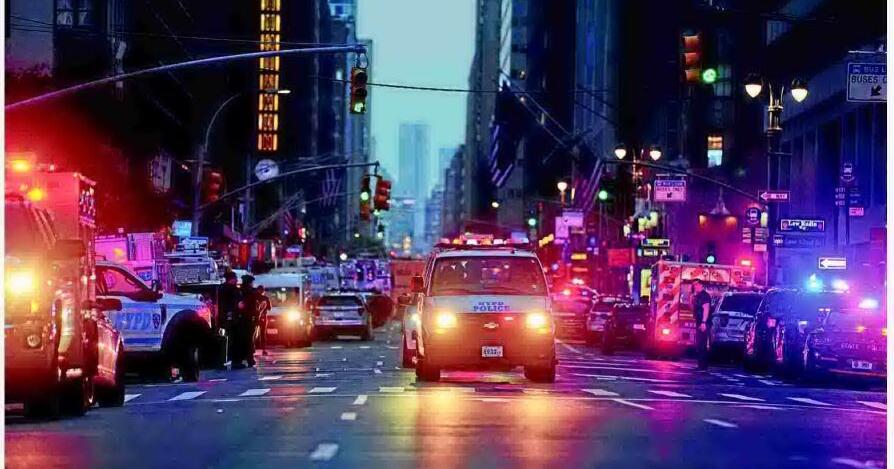The NFL community is grappling with profound sadness and reflection in the wake of a tragic Manhattan shooting near its bustling headquarters, an incident that has sent ripples of concern through the league’s preseason preparations and sparked wider conversations about safety and mental well-being. The attack, which claimed four lives and wounded others, underscores the fragility of security even in high-profile urban environments and has prompted an outpouring of grief and solidarity from athletes, coaches, and league officials across the country.
The harrowing events unfolded on a Monday afternoon at a Manhattan office building, where a lone gunman unleashed a senseless act of gun violence. Emergency response vehicles quickly converged on 52nd Street, illustrating the chaotic scene. Among those tragically killed was an off-duty New York police officer, Didarul Islam, who was working a corporate security detail, highlighting the bravery of first responders and the indiscriminate nature of such attacks. The assailant, Shane Tamura, 27, of Las Vegas, believed to be targeting the NFL offices due to an alleged grievance related to chronic traumatic encephalopathy (CTE), ultimately took his own life after a brief rampage.
The news resonated deeply within the league, catching many off guard as they prepared for the demanding training camp season. Graham Gano, the veteran kicker for the New York Giants and a union representative, was among those who stayed late to follow news coverage, expressing immediate concern and offering prayers for all involved. His sentiments echoed a universal sense of dismay within the NFL community, acknowledging the somber reality that such tragedies can strike anywhere, regardless of association.
NFL Commissioner Roger Goodell promptly addressed the league, confirming that a league employee was among the wounded and was surrounded by family, with hopes for a full recovery. Goodell underscored the league’s profound gratitude to law enforcement for their swift and decisive action, particularly commending Officer Islam for his sacrifice. In response to the incident, employees working in the New York office were instructed to work remotely, and a virtual town hall was organized to provide support and information, emphasizing the league’s commitment to the well-being of its personnel.
The gravity of the situation prompted player reactions and comments from figures across the league, transcending team rivalries. Three-time Super Bowl-winning Kansas City Chiefs coach Andy Reid conveyed heartfelt condolences to the victims’ families and those at the league office, stressing the urgent need for peace amid such senseless acts. Similarly, Chicago Bears coach Ben Johnson offered a sobering perspective, reminding his team that life extends beyond football, particularly in the face of such profound societal challenges, reinforcing the importance of empathy and human connection.
Investigators quickly identified Shane Tamura as the assailant, piecing together his movements within the building and uncovering a rambling note that indicated a deeply troubled state. Authorities revealed Tamura had a history of mental illness, and his apparent grievance against the NFL stemmed from a claim of suffering from CTE, a complex and degenerative brain disease. This tragic dimension adds another layer to the incident, prompting further discussions on the intersection of mental health and public safety, especially in contexts involving high-profile organizations.
Concerns over sports security and player safety naturally arose, though many in the league expressed confidence in their respective team’s measures. Giants coach Brian Daboll acknowledged the shooting in his press conference, while Gano confidently stated his team’s security staff was “fantastic” and among the best. This incident, however, served as a stark reminder of the broader challenges facing society, reinforcing the critical role of robust security protocols and vigilant awareness in protecting individuals within large public and private institutions.
The incident also brought the crucial topic of mental health to the forefront within football circles. Three-time Tennessee Titans Pro Bowl defensive lineman Jeffery Simmons highlighted how mental health is a significant issue in today’s world, emphasizing the collective responsibility within sports organizations to support their members. This reinforces the ongoing efforts within professional sports to destigmatize mental health challenges and ensure that resources are available to those who need them, creating a more supportive environment for athletes and staff alike.
As the NFL presses forward with training camps, the memory of the Manhattan tragedy serves as a poignant backdrop. The collective response from the league – from prayers and condolences to discussions on security and mental well-being – illustrates a community united in its grief and determination to foster a safer, more supportive environment for all its members. The event will undoubtedly remain a significant point of reflection for the NFL community as it navigates the complexities of modern societal challenges.






Leave a Reply